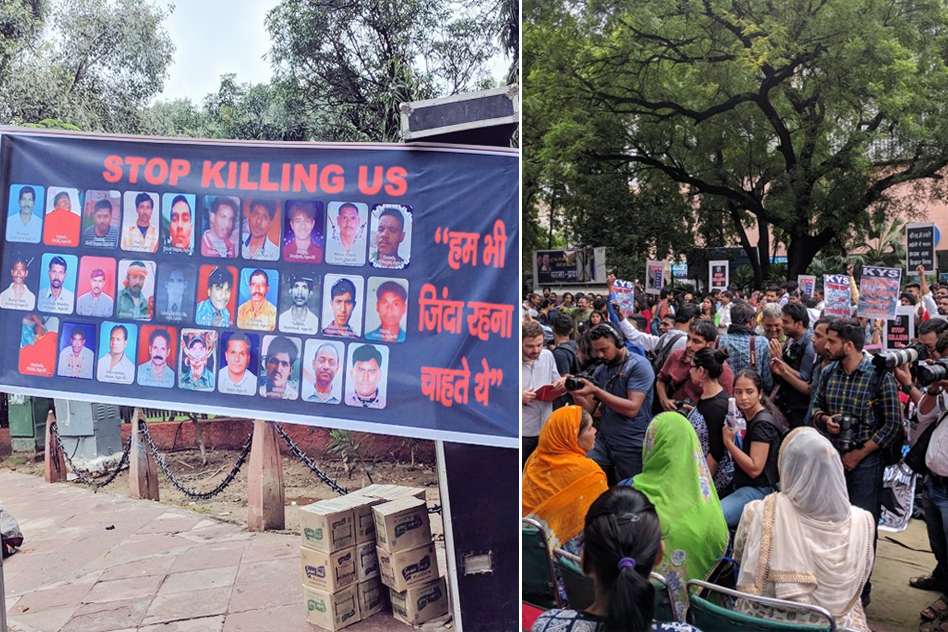“Stop killing us,” said the banner and placard of the many protesters who gathered in the national capital on September 25 to demand justice for the scores of victims who lost their life while cleaning the gutter and septic tanks. Under the banner of a non- profitable organisation, Safai Karamchari Andolan, almost 1,000 protesters including- victim’s kin, activists and many volunteers gathered at the Jantar Mantar in Delhi seeking mechanisation of sewerage system cleaning. The nationwide protest against manual scavenging was called by activist and National convener of Safai Karmachari Andolan, Bezwada Wilson.
“Deaths of sanitation workers while cleaning sewers by hand – a practice banned 25 years ago – are nothing but ‘murders by the state’,” said Bezwada Wilson while speaking to The Quint. During the protest, activist Bezwada Wilson, says, “We shouldn’t have to share these stories or re-live them. We don’t owe it to anyone. What we deserve is dignity and self-respect, like B.R. Ambedkar, had said – and that is what we are fighting for,” as reported by The Wire. Bezwada has been fighting for the sanitation workers for many years has even won the 2016 Ramon Magsaysay Award for his fight.
“The protest is for the awareness of the people and their rights. The government has done nothing for these people. They are just getting exploited by the government. The victim’s family do not even get any financial aid,” said Wilson while taking to The Logical Indian.
#StopKillingUs pic.twitter.com/a3EUDs1fzp
— Bezwada Wilson (@BezwadaWilson) September 25, 2018
Band kar, band karo.. Sewer mein hatya band karo. #StopKillingUs pic.twitter.com/RL6bbVNSpo
— Bezwada Wilson (@BezwadaWilson) September 25, 2018
Justice for the death of loved ones
The nationwide band was called after the recent death of five men aged between 18 to 30 after inhaling toxic gases while cleaning a septic tank at a residential complex in Moti Nagar, West Delhi. Their co-workers claimed that the men hired as housekeeping staffs, were threatened to go inside the tank, failing which they would be fired from their job. Their colleagues also claimed that no belt or mask was provided to the workers while they were going inside the tanks.
Rani, the kin of one of the victims (Anil) was present at the protest. Rani and Anil had planned to marry next week, but the toxic fumes inside the septic tank in which Anil lost his life, took away her dreams. Babli whose husband died from asphyxiation in a Ludhiana sewer on April 7, 2015, was also present at the protest to demand justice for her loss. While speaking to The Tribune she said, she had received Rs 10 lakh compensation. “But money is no compensation for a lost life. I’ve lost everything with my husband’s death. I have three small children who will now grow up with uncertain futures. I have not even got a government job after my husband passed away. I am here because I want to save other men in this abominable profession. No one deserves to die in a gutter,” said Babli, who was accompanied by another woman Veena whose husband died similarly in 2014.
Activist Kavitha Krishnan was also present at the protest while speaking to The Wire she said, “On one hand our government is speaking of Swacch Bharat, our leaders including PM Modi are posing with a broom, but on the other hand the people who are actually cleaning the sewers are being forced to die in toilets.”
"We are ignoring this silent genocide of Dalits in our country's sewers": @kavita_krishnan #GRIT #StopKillingUs pic.twitter.com/sCoR82WqLe
— The Wire (@thewire_in) September 25, 2018
“One person has died every five days”
In India, the practice of manual scavenging is banned since 1993 under the Prohibition of Employment as Manual Scavengers and their Rehabilitation Act. As per this Act, the law prohibits local authorities or agencies from employing a worker to clean sewers and septic tank as well.
According to an inter-ministerial task force report, it was recorded that more than 53,000 manual scavengers are employed in 12 states. The Report was published in June, which covered only 121 districts in 12 states including- Uttar Pradesh, Maharashtra, Rajasthan and Haryana.
However, Bihar, J&K, Jharkhand, Karnataka, Telangana and West Bengal are yet to participate in the survey. The survey does not include cleaning sewers and septic tanks, and data from the Railways, which is the largest employer of manual scavengers, as reported by The Indian Express.
The National Commission for Safai Karamcharis (NCSK), the statutory body has collated the number of deaths due to cleaning septic tanks. The data says that since January 1, 2017, on an average at least one person has died every five days while cleaning sewers and septic tanks across the country. The NCSK was set up by an Act of Parliament for the welfare of sanitation workers.
Also Read: Manual Scavenging Is Banned In India; Know About It












